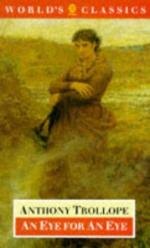As he hurried down the hill to the beach at Coolroone, where Morony was to meet him with the boat, he could not keep himself from comparisons between Kate O’Hara and Sophie Mellerby. No doubt his comparisons were made very incorrectly,—and unfairly; but they were all in favour of the girl who lived out of the world in solitude on the cliffs of Moher. And why should he not be free to seek a wife where he pleased? In such an affair as that,—an affair of love in which the heart and the heart alone should be consulted, what right could any man have to dictate to him? Certain ideas occurred to him which his friends in England would have called wild, democratic, revolutionary and damnable, but which, owing perhaps to the Irish air and the Irish whiskey and the spirit of adventure fostered by the vicinity of rocks and ocean, appeared to him at the moment to be not only charming but reasonable also. No doubt he was born to high state and great rank, but nothing that his rank and state could give him was so sweet as his liberty. To be free to choose for himself in all things, was the highest privilege of man. What pleasure could he have in a love which should be selected for him by such a woman as his aunt? Then he gave the reins to some confused notion of an Irish bride, a wife who should be half a wife and half not,—whom he would love and cherish tenderly but of whose existence no English friend should be aware. How could he more charmingly indulge his spirit of adventure than by some such arrangement as this?
He knew that he had given a pledge to his uncle to contract no marriage that would be derogatory to his position. He knew also that he had given a pledge to the priest that he would do no harm to Kate O’Hara. He felt that he was bound to keep each pledge. As for that sweet, darling girl, would he not sooner lose his life than harm her? But he was aware that an adventurous life was always a life of difficulties, and that for such as live adventurous lives the duty of overcoming difficulties was of all duties the chief. Then he got into his canoe, and, having succeeded in killing two gulls on the Drumdeirg rocks, thought that for that day he had carried out his purpose as a man of adventure very well.
During February and March he was often on the coast, and hardly one visit did he make which was not followed by a letter from Castle Quin to Scroope Manor. No direct accusation of any special fault was made against him in consequence. No charge was brought of an improper hankering after any special female, because Lady Scroope found herself bound in conscience not to commit her correspondent; but very heavy injunctions were laid upon him as to his general conduct, and he was eagerly entreated to remember his great duty and to come home and settle himself in England. In the mean time the ties which bound him to the coast of Clare were becoming stronger and stronger every day. He had ceased now to care much about seeing




